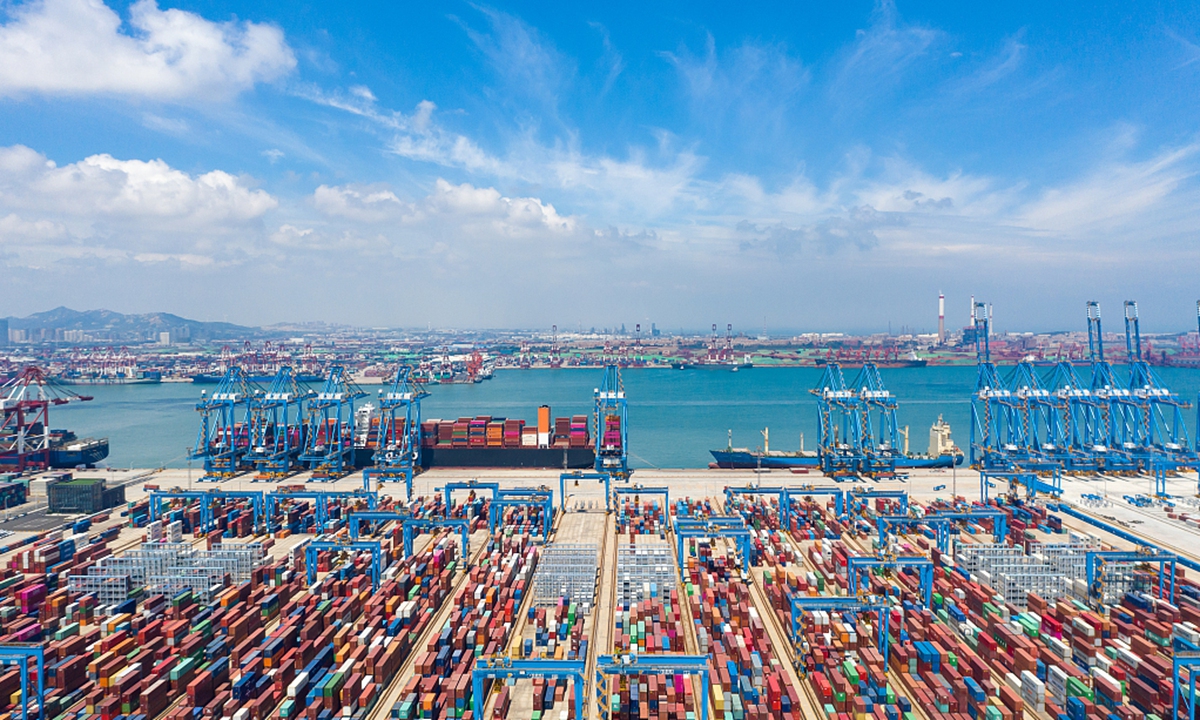
Photo: VCG
The global economic landscape is undergoing major changes. The growth rates of traditional major economies seem to decelerate, while emerging market economies, especially China and India, rise rapidly. In 2000, China's share of global GDP was 6.9 percent, and in 2018, it accounted for 16.8 percent.
What are the reasons for the rapid economic growth of emerging economies like China? Developed economies need to invent and create new technologies to upgrade their industrial structure. Emerging economic markets have the advantage of being latecomers and can also benefit from globalization. Globalization allows emerging markets to have enough markets to leverage their competitive advantages. In a changing global landscape, of course, the biggest loser from a psychological point of view is the US, because throughout the last century, the US has always been the largest economy in the world.
China overtook the US to become the world's largest economy in 2014 (in purchase power parity). In the face of such changes, the US wants to take some measures to maintain its own economic output and contain China's rise. China's economy is the largest in size, but its economic strength is lower than the US in terms of per capita levels. The higher level of per capita GDP and higher production level in the US means that it has a stronger technological footing, stronger financial strength and stronger military strength. There is a new trend in the US that some companies want to decouple from China. To some extent, the US also hopes to encircle China through its strategy in the Asia-Pacific region.
Faced with today's situation, what is the best strategy for China? First of all, at the moment, China will do everything in its capacity to avoid a conflict. China needs to see how historical experience can prevent a war. In addition, China needs to maintain dynamic economic development and keep its economy open.
At present, China is still in the process of catching up with the US. China's per capita GDP is equivalent to a quarter of the level of the US. With higher GDP per capita and technology per capita, the US can use technology as a weight to contain China. But China continues to make strides in catching up, and China has the advantage of being a latecomer. China has an annual growth potential of 8 percent. China is endowed with a huge domestic market. Meanwhile, China has a high share of the international economy, and China's good political environment can ensure its stable growth. These are all China's advantages helping it to maintain dynamic economic growth.
China actively maintains openness and can become an enabler of globalization. China has accounted for a quarter to a third of annual global growth since 2008. If China can maintain such a pace of growth, China will continue to contribute to the development of the global economy, so it will continue to contribute at least a quarter or more of global growth every year. China is the largest trading partner of more than 120 countries and the second largest trading partner of more than 70 countries. Many countries benefit a lot from their win-win bilateral trade ties with China. If China can maintain dynamic economic growth and keep opening up, China's growth will provide growing opportunities for other countries.
Other countries will find that their countries' trade growth is benefiting from China's domestic growth, including the creation of some local jobs and economic development. Therefore, it is very important to maintain good trade relations with China, so that these countries can maintain economic growth, employment rate, private sector development. Therefore, in this way, China can dismantle US attempts to promoting economic decoupling from China.
Maintaining a dynamic economic growth rate and keeping opening up, China's economy will be twice the size of the US economy. When that day comes, the US will have to make a balance and recalibrate itself. It must trade with China and maintain good relations with China.
The article was compiled based on a speech by Justin Lin Yifu, former chief economist of the World Bank at the Tsinghua PBCSF Chief Economists Forum in Beijing. bizopinion@globaltimes.com.cn
